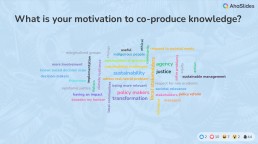ICYMARE – DKN collaboration
Knowledge co-production for sustainable oceans
‘Conference’ seems an inadequate word to describe participating in ICYMARE. ICYMARE is a network that goes beyond professional barriers to connect young, motivated, and engaged researchers in the field of coastal and marine sciences. The shared academic and personal experiences of ICYMARE participants provides a platform for the exchange of knowledge and experiences, and a foundation for personal support amongst Early-Career Researchers (ECRs) from many different countries and academic disciplines.
Sustainability research is a major field of interest for ocean conservation, and the importance of inter- and transdisciplinary research approaches is gaining momentum in different research agendas. That being said, such approaches are rarely simple to conduct. Difficulties are further amplified for ECRs, especially when research pathways include engagement with non-academic actors, such as decision-makers and politicians. As such, the benefits and challenges of co-producing knowledge with science and society are an important issue worthy of reflection from many perspectives.
This is why we – a group of ECRs from the ICYMARE family – collaborated with senior researchers from a working group called “Anticipating and Transforming Coastal Futures” within the German Committee Future Earth (Deutsches Komitee für Nachhaltigkeitsforschung – DKN) to connect and dissect the difficulties and obstacles faced by ECRs in pursuit of co-producing knowledge with societal actors.
This idea was born during one of the ICYMARE Online Forums in January 2021 called “Social-Ecological Systems” which brought together interdisciplinary ECRs. Participants presented their ongoing research in coastal and marine social-ecological systems (SES) and was followed by a discussion in which the hosts, presenters, and forum participants identified various difficulties that arise while conducting interdisciplinary research. Inspired by the paper by Kelly et al. (2019), “Ten tips for developing interdisciplinary socio-ecological researchers”, the forum concluded with 10 Tips for trans-/interdisciplinary ECRs from trans-/interdisciplinary ECRs (see figure).
These tips, however, were only targeted at what ECRs can change in their own behaviour. This drew our interest to what other obstacles exist and whether they are of systemic nature. To act on this curiosity, we designed an online survey to expand our understanding on this topic. We formulated questions about the motivation of ECRs to co-produce knowledge together with non-academic actors; the methods they apply; and the difficulties they face before and during their research. In total, 46 ECRs from more than 15 different countries participated in the survey and shared their experiences.
At a second workshop in October 2021 we shared our findings from the survey. In this workshop we shed light on different approaches of knowledge co-production by exploring some personal stories of knowledge co-production presented by two early-career and two senior researchers. We also presented initial findings of the online survey, and finally discussed ways of mitigating negative impacts on ECRs future pathways together with members of the DKN working group (see figure).
After the workshops, we had a number of meetings to reflect on the outcomes and determined a direction for a perspective paper based on findings from the workshops and the online survey. Our writing and organization meetings around knowledge co-production not only served the utilitarian purpose of creating a paper, but also represented a way to enact the peer-support community we envision. Having this shared open space to exchange and meaningfully learn with and from each other directly put our recommendations into practice and was also an enjoyable network enhancement. It showed how much we can do when operating in a safe and supportive environment while being free to follow our curiosity and engage in joint exploration.
This work in itself presents a process of knowledge co-production between ECRs and shows, how our different expertise came together and shaped our ideas along the journey of almost one year. If you would like to view the final scientific output, please find the article here. The supplementary material of this article also provides context for those interested in knowledge co-production and transdisciplinary research. We hope that by sharing our experiences we can inspire future ECRs from the ICYMARE family to come up with their own projects and to support each other in their own career development.
Lena, Denis, Julia, Michi, Mafaziya, Xochitl & Zoe

Word cloud by workshop participants from the second workshop
Figure 1 Summary of obstacles (left) to be tackled at different organizational levels (pyramid) with corresponding mitigating actions (right) and action pathways (horizontal arrows). The pyramid represents the hierarchy of needs with institutions (bottom) that are to be met before the needs at the individual level (top) can be resolved. The community (peer and broad scientific community) and supervisory level (middle) were considered as support systems to overcome obstacles and improve the engagement with local actors. Vertical arrows on the right side represent top-down and bottom-up actions that are needed to leverage change towards a more inclusive environment for ECRs engaging in knowledge co-production.

